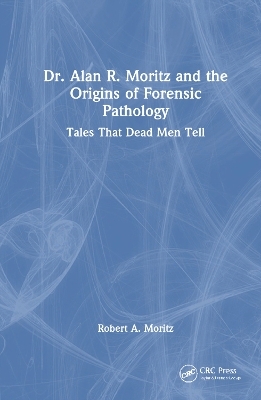
Dr. Alan R. Moritz and the Origins of Forensic Pathology
CRC Press (Verlag)
978-1-032-88612-1 (ISBN)
- Noch nicht erschienen (ca. März 2025)
- Versandkostenfrei innerhalb Deutschlands
- Auch auf Rechnung
- Verfügbarkeit in der Filiale vor Ort prüfen
- Artikel merken
Dr. Alan R. Moritz and Forensic Pathology: Tales that Dead Men Tell, written by Dr. Moritz’s journalist grandson Rob Moritz, recounts his life and career from personal papers and correspondence, interviews, newspaper accounts and other sources, including archived materials from Harvard Medical School, the Rockefeller Foundation, Case Western Reserve University and the University Hospitals of Cleveland. Chapters chronicle more than a half-century of ground-breaking research and high-profile investigations, including some of the 20th century’s most infamous cases. This includes the assassination of President John F. Kennedy, the Sam Shepherd case, the Cocoanut Grove nightclub fire, the Attica prison riots and the Texas Tower sniper, as well as his contributions to the well-known Nutshell Studies of Unexplained Death. Dr. Moritz, the inspiration for the first on-screen forensic scientist, is credited with being one of the most prominent pioneers of the last century, helping to move forensic medicine from the political jurisdiction of untrained local coroners to a respected scientific discipline that fascinates the public.
The book also details Dr. Moritz’s travels, during which he experienced some of society’s darkest chapters. This includes an infamous lynching during the “Red Summer” of 1919, the rise of Nazi Germany and the degradation of apartheid in South Africa, all of which influenced and shaped his worldview. Highlights of Dr. Moritz’s work, recounted in detail, include career stops at Case Western Reserve University in Cleveland and Harvard Medical School in Boston. Coverage details his most salient and well-known research—as well as insightful anecdotes and stories that demonstrate Dr. Moritz’s character and the development and evolution of his scientific views over the years.
Features include:
Profiles the life of a well-known and impactful figure in the advancement of forensic pathology’s public perception and practices in the United States.
Provides background on Dr. Moritz’s seminal work, the article Classical Mistakes in Forensic Pathology
Of interest to medical practitioners, history of science buffs, and forensic practitioners interested in the early history and development of forensic pathology as a discipline
Dr. Alan R. Moritz and Forensic Pathology fills in a missing chapter on the life, research, and lasting legacy of Dr. Moritz, providing insight into the development of modern forensic pathology practice by examining the momentous contributions and character of one of its true pioneers.
Rob Moritz is a veteran journalist who reported on crime, government and politics for newspapers in Arkansas, Texas and Tennessee before teaching journalism at the University of Central Arkansas. The third of four sons born to a bauxite miner and a saint, he was born in Kingston, Jamaica, and spent much of his youth in the small South American country of Suriname and in Pittsburgh, Pennsylvania, before moving to Arkansas in high school. His wife, Gwen, is a journalist who spent much of her career as editor of Arkansas Business. They have two adult sons.
Introduction
1. From Nebraska to the World
2. College and Medical School
3. Red Summer, 1919
4. Cleveland
5. Vienna
6. Getting to Harvard
7. Nazi Germany
8. Harvard Years
9. Burn Studies
10. Cocoanut Grove
11. ‘Death on a Silver Platter’
12. Leaving Harvard
13. Going Hollywood
14. Back in Cleveland
15. Family Mystery
16. ‘Classical Mistakes’
17. JFK
18. The Moritz Formula
19. Apartheid
20. Of Myth and Legend
21. Legacy
Appendix 1
Appendix 2
Appendix 3
| Erscheint lt. Verlag | 13.3.2025 |
|---|---|
| Zusatzinfo | 17 Halftones, black and white; 17 Illustrations, black and white |
| Verlagsort | London |
| Sprache | englisch |
| Maße | 156 x 234 mm |
| Themenwelt | Studium ► Querschnittsbereiche ► Geschichte / Ethik der Medizin |
| Naturwissenschaften ► Biologie | |
| Recht / Steuern ► Strafrecht ► Kriminologie | |
| ISBN-10 | 1-032-88612-9 / 1032886129 |
| ISBN-13 | 978-1-032-88612-1 / 9781032886121 |
| Zustand | Neuware |
| Haben Sie eine Frage zum Produkt? |
aus dem Bereich


